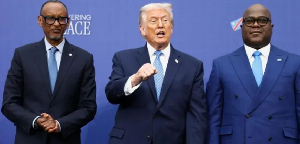…Over Ghana Rating
By J. Ato Kobbie, Managing Editor
Standard & Poor’s (S&P) downgrading of Ghana from ‘B+’ to ‘B’ in its latest sovereign rating of 2010 last Friday, has sparked condemnation from leading economists and analysts, who have exposed the fraud in the rating agency’s grading of Ghana.
Razia Khan, Head of Macroeconomics and Research, Africa for Standard Chartered Bank, based in London, has said that “the citing of 'recent moves by the government to interfere with the sale of privately owned oil assets' (by Standard & Poor’s in its rating of Ghana) “suggests that other factors - not directly related to Ghana's creditworthiness - may have been significant in the decision.”
Promising to make available a more in-depth examination of the factors influencing Ghana's rating, Ms Khan said even though Ghana faced challenges, “things are at least moving in the right direction.”
Razia Khan, an internationally respected economist, who is widely consulted on the continent’s developmental issues, said in a release yesterday that “while Ghana does have its fiscal issues, we note that none of these is new news - and on balance, fundamentals in Ghana have been improving, not getting worse.”
She continued that “From this perspective, it is difficult to justify the ratings action now,” which situation is made worse by the obvious reference to the Kosmos Energy attempt to sell its assets in Ghana’s oil fields.
“Independently, there is little reason to expect that oil production will be substantially delayed, and oil was in any case never going to resolve Ghana’s fiscal issues on its own. A more
in-depth examination of the factors influencing Ghana's rating will be
available shortly,” she concluded.
Meanwhile, Ghanaian economist, Dr. Nii Moi Thompson, has revealed that “the deficit figures used by S&P exist nowhere - not at Finance, BoG, IMF, or the World Bank.” He said coming in the wake of Forbes’ flawed analysis of the nation’s economic state, he was beginning to wonder just how they did their work.
“Well, ‘strange’ doesn't even fully capture what is going on here,” were the preliminary remarks of Dr. Nii Moi Thompson to an observation on Standard and Poor’s (S&P) latest rating, made by Samir Gadio, a London-based emerging-markets strategist with Standard Bank Plc that the downgrading of downgrading of Ghana was ‘a bit strange.’
“This is what Nkrumah talked about. This is a wake-up call for Africa to unite and strengthen our collective defenses against such blatant manipulation of our fortunes. It is also a reminder for us to manage our oil resources well, so that we, not they, would be making the call,” Dr. Nii Moi Thompson cautioned.
Dr. Thompson questioned the basis for the conclusions and data cited by S&P in its rating of Ghana as far as fiscal deficit targets and a reference to lack of clarity in oil sector regulation and management of government oil revenue.
Both Nii Moi Thompson and a Deputy Minister for Energy cited the Petroleum Revenue Management and Petroleum Exploration and Production bills, which have been submitted to Parliament.
S&P reasoning for the downgrading is what it said were Ghana’s unrealistic “medium-term fiscal targets of a deficit of 2.1% in 2011 and 1.6% in 2012,” and that it expected “Ghana's general government deficit to be around 8.5% of GDP in 2010 and to only slightly decrease over the next few years.”
"The lowering of the ratings on Ghana reflects our view of the cumulative effect of a large and erratic fiscal deficit, substantial supplier arrears, high debt levels, loss-making state-owned enterprises, and problems in the banking sector," said Standard & Poor's credit analyst Ravi Bhatia had said on the rating, continuing, "In addition, there are concerns over a lack of clarity in oil sector regulation and in the management of the government's oil revenues."
Dr. Thompson backed his argument with a graph of official GDP to fiscal deficit data from 2004 to 2013 sourced to the Bank of Ghana and IMF, which is at variance with S&P’s bringing into sharp focus questions on the integrity of data used by the rating agency.
The figures attributed to Ghana by S&P in its analysis are sharply different from the actual official projections of 4.5% and 3.5% for 2011 and 2012 respectively, and 8.0% for 2010.
“One can only conclude that, like the Wall Street Journal, Forbes, and the Washington Times, S&P has also fallen under the manipulative spell of Kosmos-Exxon and their array of relentless operatives. Bear in mind that government's action on Kosmos' intended sale of its shares to Exxon had been anything but arbitrary,” emphasized Nii Moi, who added that this has been “in accordance with the rule of Ghanaian and international laws and certainly nowhere near the kind of savage beating that BP, for example, has taken from Obama and the American public,” and wondered: “Why, isn't a government allowed to seek the interest of its people without coming under the evil manipulations of organizations like Standard & Poor's?”
In an e-mail response to Bloomberg the Standard Bank analyst had described the rating reduction of Ghana as “a bit strange,” especially with the country due to begin oil production later this year, adding that “A downgrade would have made sense in late 2008 or early 2009 when the fiscal deficit hit 15 percent” of gross domestic product.
Oil: Lack of clarity?
Deputy Minister for Energy, Hon. Emmanuel Armah-Kofi Buah, was however, very blunt.
“The statement that there is no clarity in the direction of the oil industry is dishonest,” he stressed, adding that “What they’ve said points to the opposite of everything that we’ve done. .
According to Hon. Buah, who is also the Member of Parliament (MP) for Elembele Constituency in the Western region, “We’ve taken the lead in all the initiatives that will show transparency. Cabinet has already approved the Extractive Industry Transpare ncy Initiative (EITI), which will also apply to the oil industry.”
He noted that following Cabinet approval of the Petroleum Revenue Management Bill, which was formulated after extensive consultation with the people of Ghana, including all stakeholders, as a result of which a comprehensive petroleum bill is before Parliament, it was strange for Standard and Poor’s to make the allusions about lack of clarity in the oil sector
Mr. Buah said government was committed and “we are very clear in our minds about the direction we are going, where the oil industry would be regulated transparently; an oil industry that would respect the environment; protect the people of Ghana to ensure that the revenue from oil will ultimately benefit the people of Ghana.”
He said he did not understand where the S&P argument that ‘there are concerns over a lack of clarity in oil sector regulation and in the management of the government's oil revenues’ was coming from and assured that “We’re going to continue to be committed and stand up for the people of Ghana.” The Business Analyst,
thebusinessanalystgh@yahoo.com
Please read the text of Ghana’s rating below.
==========================================================================================================================================
Text of The Standard & Poor’s Ghana Rating
Highlights
-- The fiscal flexibility of Ghana's government is reduced by its large fiscal deficits, substantial supplier arrears, high debt levels, loss-making state-owned enterprises, and problems in the banking sector.
-- In addition, there are concerns over a lack of clarity in oil sector regulation and in the management of the government's oil revenues.
-- As a result, we are lowering the local and foreign currency sovereign credit ratings on Ghana. At the same time, we are lowering the transfer & convertibility assessment to 'B+', and the recovery on Ghana's foreign currency debt to '4'. The outlook is stable.
-- The stable outlook is based upon our expectation of sound economic growth and that fiscal and economic reforms will continue.
Aug. 27, 2010--Standard & Poor's Ratings Services said today that it lowered its 'B+' foreign currency and 'B+' local currency long-term sovereign credit ratings on the Republic of Ghana to 'B'. The outlook is stable. In addition, Standard & Poor's lowered the sovereign's transfer & convertibility assessment to 'B+' from 'BB-' and its recovery rating to '4' from '3'. "The lowering of the ratings on Ghana reflects our view of the cumulative effect of a large and erratic fiscal deficit, substantial supplier arrears, high debt levels, loss-making state-owned enterprises, and problems in the banking sector," said Standard & Poor's credit analyst Ravi Bhatia. "In addition, there are concerns over a lack of clarity in oil sector regulation and in the management of the government's oil revenues."
Following the peaceful, but intensely fought, elections held in December 2008 and January 2009, the new administration committed to reducing the economy's imbalances. In our view, however, its medium-term fiscal targets of a deficit of 2.1% in 2011 and 1.6% in 2012 are unrealistic. We expect Ghana's general government deficit to be around 8.5% of GDP in 2010 and to only slightly decrease over the next few years. Although Ghana will benefit from oil-related revenue going forward, we believe that expenditure pressures are significant and may lead to spending increases, exacerbated by supplier arrears that need to be paid, and fueled by the 2012 presidential elections. The Multilateral Debt Relief Initiative contributed to a dramatic reduction in Ghana's net external debt in 2006, but the public sector has been releveraging quickly, and we expect general government to reach 62% of GDP at year-end 2010. This is substantially above the median 'B' of 41%, and one of the highest government debt levels of rated sovereigns in Sub-Saharan Africa. In our opinion, the oil sector may suffer from a lack of clear regulation, and recent moves by the government to interfere with the sale of privately owned oil assets may delay production and may damage investor sentiment.
Despite the expected oil-related revenue, Standard & Poor's believes that the trend of fiscal consolidation has not been firmly established, and we expect Ghana's fiscal and external balances to remain in deficit over the next few years. We lowered the recovery rating on Ghana's foreign currency debt to '4', indicating an expected 30%-50% recovery rate under a default scenario. We believe that, under such a scenario, Ghana's ability to offer a high recovery rate would be limited by its increasing debt levels. We also believe that recovery incentives may depend on the degree of domestic political continuity. The stable outlook is based upon our expectation of sound economic growth and that fiscal and economic reforms will continue. It is also based on our expectation that oil-related revenue will support the external balances. Downward pressure on the ratings could arise if the ongoing fiscal correction and the planned reduction in arrears are not implemented.
Conversely, prudent use of oil revenues, continued reductions in the fiscal and external deficits, repayment of trade arrears payable and a lengthening of domestic debt maturities could support a higher rating level.
Business News of Wednesday, 1 September 2010
Source: Business Analyst












